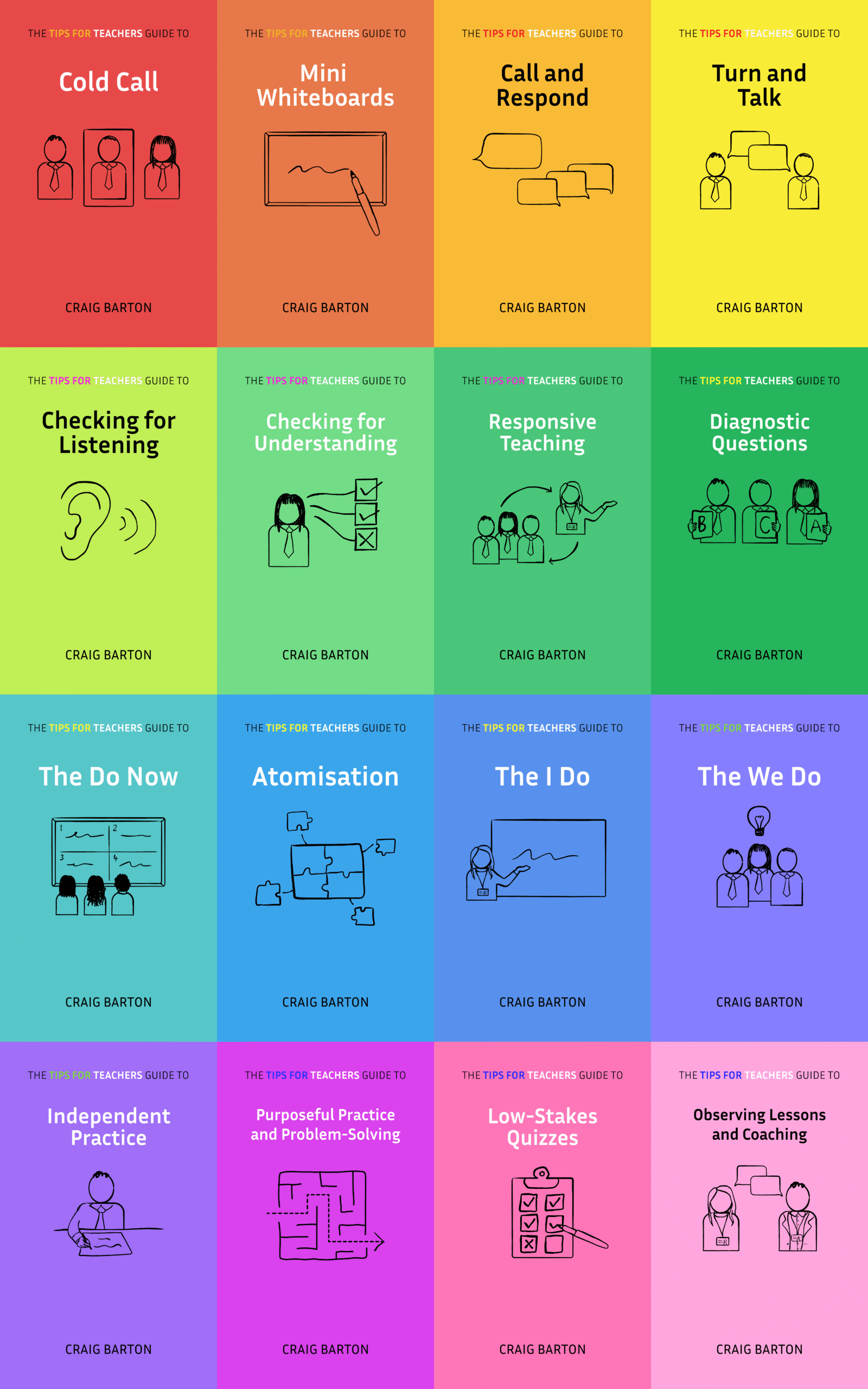
Contents
- Making changes to our practice
- Motivation and engagement
- Explicit instruction
- Cognitive load theory
- Means of participation
- Attention and Checking for listening
- Checking for understanding
- Multiple-choice questions
- Errors
- Confidence
- Modelling and Worked examples
- Practice and problem-solving
- Memory and retrieval
- Desirable difficulties
- Homework, marking and feedback
- AI and education
- For the Maths geeks
- A bit of everything
I have used NotebookLM to summarise research papers that have influenced my thinking and practice. Click on a link to:
- Read a summary of the paper
- Listen to a deep-dive podcast
- Read a breakdown of the key insights for teachers
- Read a quote from the paper
The danger with any summary is that you take it as a complete representation of the paper. I have provided a link to the original paper so you can do your own digging.
Enjoy!
Making changes to our practice
- Teaching Practice: A Cross-Professional Perspective
- Professional Development & Cognitive Load
- Practice-Based Teacher Education Pedagogies Improve Responsiveness
- Modelling evidence-based practice in initial teacher training
- EAST – Four simple ways to apply behavioural insights
- The Effect of Teacher Coaching on Instruction and Achievement
- Practice Does Not Make Perfect – Experimental Evidence on the Effectiveness of Coaching Beginning Teachers
- Those Who Understand: Knowledge Growth in Teaching
Motivation and engagement
- Achieve and thrive: A research-based guide to pupil motivation and engagement
- Intrinsic Motivation and Achievement in Mathematics in Elementary School
- Extrinsic Rewards and Intrinsic Motivation in Education
- What Teachers Say and Do to Support Students’ Autonomy During a Learning Activity
- The role of rewards in motivation—Beyond dichotomies
- The influence of seductive details in learning environments with low and high extrinsic motivation
- The effect of clarity on learning: impacting motivation through cognitive load
- Development of a systematic humor pedagogical framework to enhance student learning outcomes
- Narrative characteristics of captivating secondary mathematics lessons
- The boy paradox: exploring motivational factors in gender differences and academic achievement across ages 9–14 years
- Teaching to the test: Unraveling the consequences for student motivation
Explicit instruction
- Project Follow Through
- Theory of Instruction
- Why minimal guidance during instruction does not work
- Exploring the Foundations of Explicit Instruction
- Features of Direct Instruction: Interactive Lessons
- Rosenshine’s Principles of Instruction
- Learning about learning
- The Components of Direct Instruction
- Developing Curriculum for Deep Thinking – The Knowledge Revival
- Testing the meshing hypothesis in prospective teachers
- Seating arrangements that promote positive academic and behavioural outcomes
- The Opportunity Makers: How a Diverse Group of Public Schools Helps Students Catch Up — and How Far More Can
- Improving educational outcomes in America
Cognitive load theory
- Cognitive Load Theory: The story of a research programme
- The transient information effect
- The Moderating Role of Interest in the Relationship between Perceived Task Difficulty and Invested Mental Effort
- Cognitive Load Theory: Emerging Trends and Innovations
- A cornerstone of adaptivity – A meta-analysis of the expertise reversal effect
Means of participation
- Engaging “silent” students in classroom discussions
- Opening the Gateway to Oral Participation
- Analysing student talk in whole-class teaching
- Exploring the relationship between metacognitive and collaborative talk during group mathematical problem-solving
- A Comparison of Choral and Individual Responding
- Cooperative Learning and Achievement
Attention and Checking for listening
- Investigating attention contagion between students in a lecture hall
- Attention contagion online
- Listen up, kids! How mind wandering affects immediate and delayed memory in children
- Attention, Mindwandering, and Mood
- Levelling the playing field: Attention mitigates the effects of intelligence on memory
Checking for understanding
- Embedding formative assessment
- The Dunning-Kruger Effect
- The “curse of knowledge” when predicting others’ knowledge
- Inside the Black Box
- An analysis of undergraduate core material in the light of hand-held computer algebra systems (Pointon and Sangwin’s question taxonomy
- Wait Time: Slowing Down May Be A Way of Speeding Up
- Self-explaining: The dual processes of generating inferences and repairing mental models
- Effective Questioning and Responding in the Mathematics Classroom
- A Study of Students’ Readiness to Learn Calculus
- Student-generated examples in the learning of mathematics
- Learning about Functions through Learner-Generated Examples
- Updated Meta-Analysis of the Research on Response Cards
Multiple-choice questions
- Using Diagnostic Classroom Assessment: One Question at a Time
- Diagnostic Questions: Is There Value in Just One?
- Feedback enhances the positive effects and reduces the negative effects of multiple-choice testing
- The memorial consequences of multiple-choice testing
- Optimizing Multiple-Choice Questions for Retrieval Practice
- The Derring Effect: Deliberate Errors Enhance Learning
- Developing, Analyzing, and Using Distractors for Multiple-Choice Tests in Education
- The Impact of item flaws, testing at low cognitive level, and low distractor functioning on multiple-choice question quality
- Constructing Written Test Questions For the Basic and Clinical Sciences
- Nonfunctional distractor analysis: An indicator for quality of Multiple choice questions
- Three Options Are Optimal for Multiple-Choice Items
- Evaluating the Quality of Higher Education Instructor-Constructed Multiple-Choice Tests
- Secondary School Mathematics Teachers’ Accuracy at Predicting Student Errors
- Kahoot! Game-based digital learning platform
Errors
- Learning from Errors
- Learning from errors and failure in educational contexts
- The Derring Effect: Deliberate Errors Enhance Learning
- Three Types of Conceptual Change: Belief Revision, Mental Model Transformation, and Categorical Shift
Confidence
- Learning from Errors
- Long-term hypercorrection, return errors, and the transfer of learning in the classroom
- School students’ confidence when answering diagnostic questions online
Modelling and Worked examples
- Teaching with Worked Examples – Why the Selection of Problems for Exemplification is Critical
- A Meta‑analysis of the Worked Examples Effect on Mathematics Performance
- Worked Examples Moderate the Effect of Math Learning Anxiety
- Instructing students on effective sequences of examples and problems
- Low-Inference Verbal Behaviors Related to Teacher Clarity
- Two meta-analyses exploring the relationship between teacher clarity and student learning
- Keep it Coherent: A Meta-Analysis of the Seductive Details Effect
- The lure of seductive details during lecture learning
- Different types of redundancy and their effect on learning and cognitive load
- Using multimedia for e-learning
- Five ways to increase the effectiveness of instructional video
- Watching videos of a drawing hand improves students’ understanding of the normal probability distribution
- Reducing cognitive load by mixing auditory and visual presentation modes
- A meta-analysis of signaling principle in multimedia learning environments
- Learning Styles: Concepts and Evidence
- Investigating the impact of Accessible Pedagogies on the experiences and engagement of students with language and/or attentional difficulties
- Are you on slide 8 yet? The impact of standardised curricula on teacher professionalism
Practice and problem-solving
- Teachers’ use of time and student achievement
- Understanding working memory as a facilitator of math problem-solving: Offloading as a potential strategy
- Cognitive endurance as human capital
- An astonishing regularity in student learning rate
- Problem-solving in the mathematics curriculum
- Learning to think mathematically
- Critical thinking – why is it so hard to teach?
Memory and retrieval
- A new theory of disuse
- On the Symbiosis of Learning and Forgetting
- Replication and Analysis of Ebbinghaus ’Forgetting Curve
- Learning Versus Performance: An Integrative Review
- Retrieving better: A guide to retrieval practice
- Retrieval Practice “in the Wild”
- Enhancing Final Exam Performance Through Retrieval Practice
- Change in Students’ Educational Expectations
- The effect of hint strength on the benefits of retrieval practice
- Is Covert Retrieval an Effective Learning Strategy?
- Noise, Cognitive Function, and Worker Productivity
- The Memory Paradox: Why Our Brains Need Knowledge in an Age of AI
- Prior knowledge activation as preparation prior to instruction: does the coverage of relevant prior knowledge affect learning?
- Does overnight memory consolidation support next-day learning?
Desirable difficulties
- Making Things Hard on Yourself, But in a Good Way: Creating Desirable Difficulties to Enhance Learning
- The Relation Between Perceived Mental Effort, Monitoring Judgments, and Learning Outcomes: A Meta-Analysis
- Testing (Quizzing) Boosts Classroom Learning
- Using Spacing to Enhance Diverse Forms of Learning
- Understanding performance in test taking: The role of question difficulty order
- Spacing and Interleaving of Study and Practice
- Spacing and Interleaving Effects Require Distinct Theoretical Bases
- Optimal spacing schedule
- Initial Practice Performance Moderates the Distributed Practice Effect in Complex Procedural Knowledge
- Interleaving Retrieval Practice Promotes Science Learning
- A randomised control trial of interleaved maths practice
- A Meta-analytic Review of the Effectiveness of Spacing and Retrieval Practice for Mathematics Learning
- Scaling Learning Interventions: A Case Study in Interleaved Math Practice
- Pretesting Enhances Learning in the Classroom
- The pretesting effect is robust throughout adulthood, but metacognitive beliefs about pretesting and challenge differ
- Effects of initial context processing on long-term memory
- Strengthening the Student Toolbox
- Improving Students’ Learning With Effective Learning Techniques: Promising Directions From Cognitive and Educational Psychology
- Using interleaved practice to foster spelling acquisition
- Students’, Teachers’, and Parents’ Knowledge About and Perceptions of Learning Strategies
Homework, marking and feedback
- A marked improvement? A review of the evidence on written marking
- Homework literature review
- Adolescents’ Homework Performance in Mathematics and Science
- Homework Works if Homework Quality Is High
- Should parents be involved in their children’s schooling?
- Effects of Temporary Mark Withholding on Academic Performance
- The Effects of Feedback Interventions on Performance
- Nonengagement and unsuccessful engagement with feedback in lower secondary education
- Students ignore their mistakes: Elaborated error feedback processing in a digital learning system
AI and education
- Exploring the potential of LLM to enhance teaching plans through teaching simulation
- Your Brain on ChatGPT: Accumulation of Cognitive Debt when Using an AI Assistant for Essay Writing Task
For the Maths geeks
- Mathematical etudes: embedding opportunities for developing procedural fluency within rich mathematical contexts
- Fifty years of A-level mathematics: have standards changed?
A bit of everything
- Education and Intelligence: Pity the Poor Teacher because Student Characteristics are more Significant than Teachers or Schools
- Deployment of Teaching Assistants
- Examining the Academic Effects of Cross-age Tutoring
- The five-year itch: Motivational factors that influence the career decisions of early career teachers in England
- Early Numeracy and Mathematics Development: A Longitudinal Meta-Analysis on the Predictive Nature of Early Numeracy
- Explaining teachers’ judgement accuracy of students’ subjective well-being by students’ individual characteristics and the teacher-student relationship








